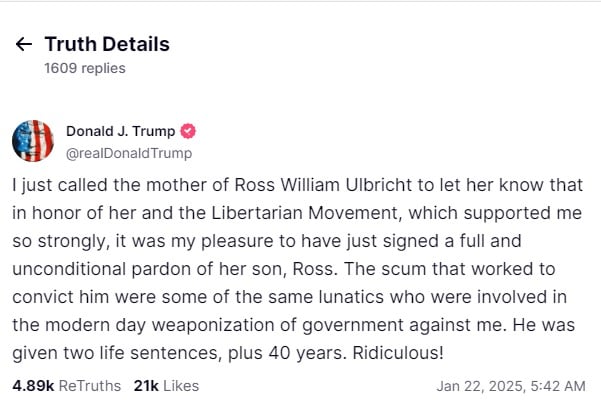Ross Ulbricht, founder of the Silk Road darknet marketplace, has been granted a full pardon by President Trump, honoring Libertarian support during his campaign.
Ross Ulbricht, the founder of Silk Road, has been fully pardoned by President Donald Trump. On Jan. 22, Trump announced the pardon on Truth Social, his own social media platform, stating that “in honor of the Libertarian Movement,” which supported his victory in the 47th U.S. presidential election, he had granted Ulbricht his freedom.

Trump also criticized the justice system, referring to those who convicted Ross Ulbricht as “lunatics” and describing his sentence of life imprisonment plus 40 years as “ridiculous.” Ulbricht was sentenced to life without the possibility of parole for his role in creating and operating Silk Road.
Launched in 2011, Silk Road was a darknet marketplace that operated until 2013 and became infamously known as the “eBay for drugs.” It facilitated anonymous transactions of illegal goods and services, primarily drugs, using Bitcoin (BTC).
At the time, Bitcoin was relatively unknown outside of niche computer circles, and Silk Road played a key role in raising public awareness of the cryptocurrency.
In February 2015, Ross Ulbricht, the creator of Silk Road, was convicted for operating the platform. He was sentenced to two life terms in prison for facilitating nearly $183 million worth of illegal drug transactions.
Silk Road was shut down by the FBI in October 2013, following a complex investigation that involved cybercrime experts and undercover agents. The key to the takedown was the identification of Ross Ulbricht, who had been using the alias “Dread Pirate Roberts.”
Authorities were able to trace Ulbricht through his online activity, including mistakes he made in forum threads discussing Silk Road and the use of an email address linked to his real identity.
The breakthrough came when investigators gained access to Silk Road’s servers, which contained a vast array of evidence, including transaction logs and private messages implicating Ulbricht. He was arrested at a San Francisco public library, where FBI agents caught him accessing the platform’s back-end server.
While Ulbricht admitted to building Silk Road, he claimed that by the time of his arrest, he had handed over control of the site and was merely a “fall guy” who took the blame after being discovered.
This article first appeared at crypto.news